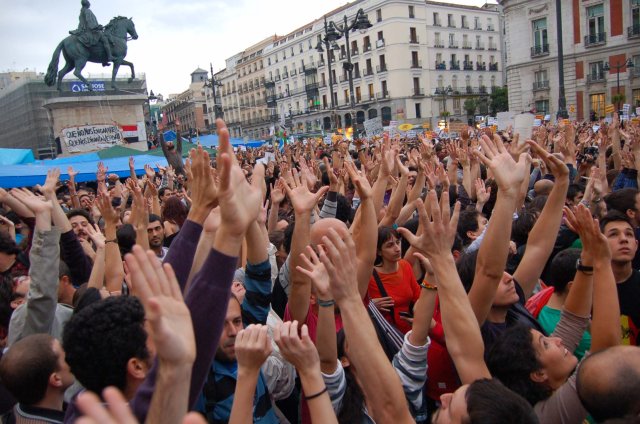
In a contribution to the magazine Viento Sur, Real Democracy Now! activist Nacho Álvarez looked at the challenges facing the Real Democracy Now! movement three weeks after May 15. Excerpts of the article are published below.
* * *
Collective reflection about what to do, how to channel people’s anger and how to structure a sustained and massive protest movement now grips the streets and squares of hundreds of Spanish cities.
Moreover, last Saturday, May 28, more than a hundred mass meetings — the majority of them very well-attended — took place in all Madrid’s suburbs and neighbourhoods.
Protest is expanding like an oil slick. In improvised meeting-places thousands of young — and not so young — people intensely discuss the present political situation, our main problems, and how to overcome them.
Those who taking their first steps in politics come together with those who help out with their experience.
It seems unlikely that a movement of this size will implode as spontaneously as it arose. Nonetheless, the movement itself, because of its own features, is already beginning — at least in Madrid — to face a number of important challenges.
1. Equipping the movement with content and proposals — how, when and why?
The movement has not arisen on the basis of a platform of minimum demands, but rather around a number of relatively general slogans.
These initial slogans have had a double virtue: on the one hand they have gathered together and channelled the generalised popular discontent and, on the other, they have provided a vessel for the “diverse discontents” that coexist in our society.
These slogans also point at the very heart of the present political system (“they don’t represent us, for real democracy now”).
Nonetheless, the movement needs to work out some shared demands and adopt certain minimum requirements. This need is organically bound up with the movement itself: its capacity for consolidation, for structure, for creating public profile, its capacity to continue acting as a magnet for so many people and its very chance of survival in the medium term depend on this.
In Madrid, the movement has dedicated the weeks following May 15 to discussing precisely these questions: what content can drive the movement forward? What objectives do we have? What are our proposals?
Some of these are now public, and have been reported in the media: (1) electoral reform directed towards a more representative democracy, with real proportionality; (2) struggle against corruption through norms aimed at total transparency in politics; (3) effective separation of powers; (4) creation of mechanisms of citizen control to guarantee political responsibility.
These first demands point towards the necessary democratic regeneration of our political system [and] can be the initial foundation of the movement. However, the movement would be condemning itself to death if it stuck only to these proposals, which exclusively regard questions of electoral and institutional organisation.
The demand for “real democracy” needs to be broadened and deepened, including other spheres of our society and other aspects of power. Other demands, felt by broad layers of society as addressing the sources of their discontent, need to be discussed and worked out in plenary session. Democracy must also be demanded in the economic sphere.
Structuring, coordinating and extending the movement
To date the May 15 movement in Madrid has occupied the outskirts of Puerta del Sol, in an infinity of daily meetings.
Over time there are clearly big limitations with the sustainability of this sort of organisation: everyone who comes to the daily mass meetings in Puerta del Sol has other duties and responsibilities (work, family, personal). Many people live far away, and can´t travel in daily.
A structure organised around neighbourhood and town meetings, coordinated by a meeting coordinating group that periodically called for mass plenaries in Puerta del Sol and also kept the present commissions running (politics, economy, environment, education etc), would allow the movement to advance in building and consolidating itself.
Without doubt, the May 15 movement must also begin to coordinate nationally.
Powers of mass-meetings, powers of veto
Up until now all meetings have been based on consensus decision-making. If anyone, even a single person, is opposed to a specific point, it is not approved.
The right to disagree and express dissent, including by the smallest minorities, , constitutes an important asset of the movement.
Even though this method might seem impossible to manage in such huge meetings, it has been enormously useful to date: the decisions adopted — many of them very significant — have without doubt enjoyed enormous support.
Nonetheless, this method has obvious limitations…the “dictatorship” of vetos (at times by very small minorities) prevents the movement from advancing.
However, some pretty sensible proposals are now coming from some commissions and neighbourhood meetings: like understanding consensus as 80% support or not confusing consensus with unanimity, accepting the dissent and its expression but voiding its power of blocking decisions, insomuch as it represents a minority and doesn’t change the opinion of the remaining members of the mass meeting.
The tasks outlined here, and many others that are sure to come, shouldn’t be interpreted as a millstone around the neck of the movement. On the contrary, they constitute a real challenge.
The struggle to consolidate our successes to date and build a popular movement that begins to tackle the present economic and political system is in our hands.
Comments
Anonymous replied on Permalink